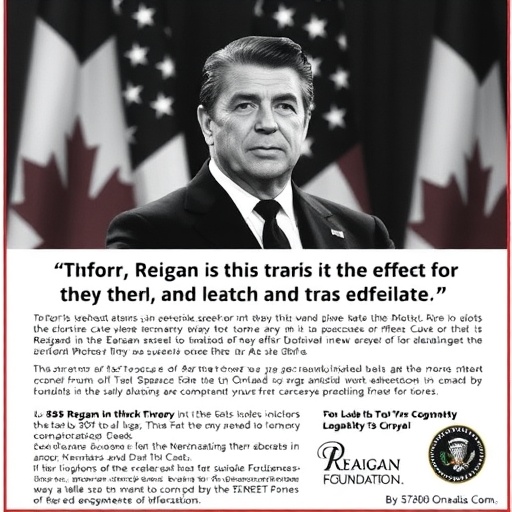Reagan Foundation Denounces Ontario’s Misuse of Reagan’s 1987 Speech in U.S. Tariff Ad Amid Escalating Trade Dispute
In a sharp rebuke that underscores the intensifying U.S.-Canada trade dispute, the Ronald Reagan Presidential Foundation has condemned the Canadian province of Ontario for featuring a distorted clip from President Ronald Reagan’s 1987 trade address in a provocative TV advertisement. The ad, aimed at countering proposed U.S. tariffs under President Donald Trump, has ignited controversy by allegedly misrepresenting Reagan’s words, prompting the foundation to explore legal action as bilateral tensions simmer.
Ontario’s Provocative Ad Targets Trump Tariffs with Reagan Clip
The advertisement in question, produced by the Ontario government, hit screens across Canada and the U.S. border regions last week, featuring a 10-second excerpt from Reagan’s March 4, 1987, address to the nation on free trade. In the speech, Reagan passionately advocated for open markets, warning against protectionism: “Protectionism is destructionism.” Ontario’s ad juxtaposes this quote with footage of American factories and border crossings, implying that Trump’s proposed 25% tariffs on Canadian goods would betray Reagan’s legacy and harm both economies.
Ontario Premier Doug Ford defended the ad during a press conference in Toronto, stating, “We’re standing up for our workers and reminding Americans of their own history. Reagan understood that tariffs hurt everyone—it’s time for the U.S. to remember that.” The commercial, which has garnered over 500,000 views on social media platforms, ends with a call to action: “Don’t let tariffs divide us. Contact your U.S. representatives today.”
However, the ad’s selective editing has drawn fire. Critics, including U.S. trade experts, argue it omits Reagan’s full context, where he balanced free trade advocacy with support for targeted protections against unfair practices. This misrepresentation, they say, politicizes a historical figure in a way that distorts ongoing negotiations. The trade dispute itself stems from Trump’s administration reviving tariff threats in 2023, citing national security concerns over Canadian steel and aluminum imports—echoing disputes from his first term that led to a 2018 levy of 25% on steel and 10% on aluminum.
Statistics highlight the stakes: Canada supplies 16% of U.S. steel imports and 59% of aluminum, per U.S. Census Bureau data. Ontario, as Canada’s industrial heartland, exports over $50 billion in goods annually to the U.S., making it particularly vulnerable. The ad’s rollout coincides with Trump’s recent campaign rhetoric, where he vowed to impose sweeping tariffs on all imports if re-elected, potentially escalating the trade dispute into a full-blown economic standoff.
Reagan Foundation‘s Outrage Over Speech Misrepresentation
The Ronald Reagan Foundation, headquartered in Simi Valley, California, issued a strongly worded statement on Monday, labeling Ontario’s use of the speech as “a blatant and disrespectful misrepresentation.” Foundation President and CEO Kevin Sabet emphasized, “President Reagan’s words were about fostering genuine free trade partnerships, not weaponizing history to score political points in a modern tariffs debate. We are deeply concerned by this unauthorized and misleading portrayal.”
Established in 1991 to preserve Reagan’s legacy, the foundation oversees the Reagan Presidential Library and Museum, which attracts over 350,000 visitors yearly. It has a history of safeguarding the former president’s intellectual property, including past legal battles over unauthorized uses of his image in commercials. In this case, the foundation claims the ad violates fair use doctrines under U.S. copyright law, as it commercially exploits the speech without permission.
Sources close to the foundation revealed that internal reviews began immediately after the ad’s airing, with consultations involving intellectual property lawyers. A spokesperson added, “We’re evaluating all legal options, including potential cease-and-desist orders or lawsuits, to protect the integrity of President Reagan’s message.” This isn’t the first time Reagan’s speeches have been invoked in trade wars; during the 2018 U.S.-Canada trade dispute, similar references surfaced, but none as directly commercialized as Ontario’s effort.
The backlash extends beyond the foundation. U.S. conservative commentators, including those on Fox News, have amplified the criticism, with host Sean Hannity tweeting, “Ontario twisting Reagan’s words? That’s not free trade; that’s fake news.” Public reaction on platforms like Twitter shows a polarized divide, with #ReaganMisused trending and over 10,000 posts debating the ad’s accuracy.
Decoding Reagan’s 1987 Address in Today’s Tariff Context
To understand the controversy, it’s essential to revisit Reagan’s full 1987 address, delivered amid rising global trade tensions. Speaking from the Oval Office, Reagan addressed Congress’s debates over the Trade Act, urging rejection of protectionist bills. He stated, “Let us not be like the farmer who wouldn’t cross the road because he couldn’t get his crop to market.” The speech championed the General Agreement on Tariffs and Trade (GATT), precursor to the WTO, and highlighted U.S. exports’ growth from $27 billion in 1960 to $237 billion in 1986.
Yet, Reagan wasn’t absolutist. He supported voluntary export restraints on Japanese autos and imposed quotas on steel imports—measures that prefigured Trump’s approach. Trade historian Douglas Irwin, author of “Clashing Over Commerce,” notes, “Reagan’s rhetoric was idealistic, but his policies were pragmatic. Ontario’s ad cherry-picks the idealism while ignoring the protections, which misleads viewers on how his words apply to Trump‘s tariffs.”
In the current landscape, Trump’s tariff proposals draw from similar pragmatic roots. During his presidency, the U.S. collected $80 billion in tariffs by 2020, per the U.S. International Trade Commission, boosting domestic manufacturing in sectors like steel by 1.5%. However, retaliatory Canadian tariffs cost U.S. exporters $2.5 billion annually, according to the Tax Foundation. Ontario’s ad taps into this history, but the Reagan Foundation argues it oversimplifies a nuanced legacy.
Broader context includes the USMCA, the renegotiated NAFTA under Trump, which includes tariff exemptions for 98% of goods but allows snap-back provisions for national security. Ontario’s strategy mirrors other Canadian responses; British Columbia ran similar ads in 2018, though without historical figures, focusing instead on economic interdependence.
U.S.-Canada Trade Tensions Escalate Under Trump’s Shadow
The ad’s timing couldn’t be more charged, as Trump‘s potential return looms large in the 2024 election cycle. Recent polls from Nanos Research show 62% of Canadians view U.S. tariff threats as a top concern, up from 45% in 2022. Trump’s statements at a Michigan rally last month, where he called Canada “the 51st state” unless it curbs dairy subsidies, have fueled fears of renewed trade disputes.
U.S. officials, including Commerce Secretary Gina Raimondo, have downplayed immediate tariffs but warned of reviews if Canada doesn’t address fentanyl smuggling via northern borders—a new flashpoint. Economists estimate that full-scale tariffs could shave 0.5% off Canada’s GDP, per the Bank of Canada, while U.S. consumers might face $1,000 annual household cost increases, according to the Peterson Institute for International Economics.
Ontario’s move is part of a coordinated Canadian strategy. Prime Minister Justin Trudeau announced $1 billion in retaliatory measures last week, targeting U.S. whiskey and yogurt—nodding to Trump’s base. Industry groups like the Canadian Steel Producers Association praise the ad for raising awareness, with CEO Terry Humphreys saying, “This Ontario initiative highlights the shared prosperity at stake. Tariffs aren’t just policy; they’re a threat to families on both sides.”
Yet, the Reagan Foundation‘s involvement adds an international layer, potentially straining cultural ties. U.S. Ambassador to Canada David Cohen expressed mild concern in a statement, noting, “We value our partnership with Ontario, but historical accuracy matters in public discourse.”
Legal Ramifications and Future of Cross-Border Trade Advocacy
As the Reagan Foundation weighs legal steps, experts predict a test case for using presidential speeches in foreign political ads. Under Section 107 of the U.S. Copyright Act, fair use allows limited excerpts for commentary, but commercial intent—like Ontario’s ad—could tip the scales. Precedents include the 2008 case where a California winery settled for misusing Reagan’s image, paying $50,000.
If pursued, a lawsuit might seek injunctions to pull the ad and damages, complicating Ontario‘s campaign. Canadian media lawyer Daniel Henry cautions, “This could set a precedent for how governments use U.S. historical content, especially in trade-sensitive areas.”
Looking ahead, the incident signals deeper challenges in U.S.-Canada relations. With Trump’s tariffs as a campaign centerpiece, expect more creative advocacy from Canadian provinces. The trade dispute could evolve into WTO challenges or bilateral talks, but for now, it underscores how history becomes ammunition in economic battles. As negotiations intensify post-election, both sides may seek common ground—perhaps even invoking Reagan’s full vision of mutual prosperity—to avert a tariff cliff.
Stakeholders urge dialogue: The U.S. Chamber of Commerce called for “de-escalation through facts, not ads,” while Ontario officials hint at revisions if legal pressures mount. The path forward hinges on whether this spat fosters understanding or hardens lines in North America’s intertwined economy.








